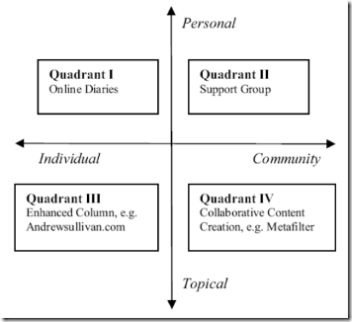This is the first time I’ve ever posted more than twice in a single day. Actually, it’s technically Tuesday now, but my days only end when I go to sleep.
Via Rough Theory, I found out that Scott Eric Kaufman at Acephalous is conducting an experiment on blogging. It goes like this:
- Write a post linking to this one in which you explain the experiment. (All blogs count, be they TypePad, Blogger, MySpace, Facebook, &c.)
- Ask your readers to do the same. Beg them. Relate sob stories about poor graduate students in desperate circumstances. Imply I’m one of them. (Do whatever you have to. If that fails, try whatever it takes.)
- Ping Techorati.
The object of the experiment is to discover how fast a (cough, ahem) “meme” can spread on the (English language) blogosphere. I’m obviously willing to participate, but danged if I don’t see holes in the methodology. For instance, I suspect it will hardly penetrate Myspace and possibly not even Xanga. Probably not Friendster blogs, either. I also doubt that the meme will be spread by retail-oriented blogs or blogs run as online community newsletters. Which is to say that Scott Eric Kaufman will not be measuring the spread of his meme through the English-language blogosphere, but rather the spread of his meme through one particular region of that blogosphere.
In “Bridging the Gap: A Genre Analysis of Weblogs” (a more developed version is found here) there is presented a blog classification scheme created by S. Krishnamurthy, where blogs are classified according to their location on a particular matrix:

I would place Acephalous on the line between Quadrants I and II, meaning that I think it’s about both SEK’s personal life and about certain topics that he uses the blog to explore.
Building upon Rebecca Blood’s typology, Herring and her co-authors also present their own classification scheme:
- Journal blogs, which are about the personal doings of the individual bloggers (i.e., most blogs on LiveJournal),
- Filter blogs, which provide commentary on things external to the blogger, such as US politics (blogs in Quadrant III of Krishnamurthy’s schema can also be called filter blogs)
- K-logs, or knowledge blogs, which are used in projects to allow project members to disseminate up-to-date information to each other
- Mixed-purpose blogs, which are combinations of two or more blog genres
- And finally, Other types of blogs which do not fall under the previous categories (Herring et al. 2004:4-6).
Using this typology, I would classify Acephalous as being a mixed-purpose blog, in this case a filter blog with some journal blogging thrown in.
My objective in classifying Acephalous, though, is to point out that being mostly a filter blog and oriented towards other filter blogs (a quick scan through the blogroll reveals mostly filter blogs), SEK’s experiment will likely end up measuring the speed of his meme among filter blogs, leaving journal blogs mostly untouched. This means that the spread of a meme through the English-language blogosphere’s biggest genre will never be measured — note, for example, that 7 out of 10 of the biggest blog hosting services focus mostly on personal journals, and that’s not even counting social networking sites like Myspace (Perseus 2005).
So in conclusion, I’ve forgotten where I was going to take the rest of this post. I’d just save this draft and work on it more tomorrow but SEK did ask participants to post ASAP, so I’ll do it now. I is sleepy, I go beddy-bye.
References
Herring, Susan C; Scheidt, Lois Ann; Bonus, Sabrina; & Wright, Elijah L. (2004), “Bridging the gap: a genre analysis of weblogs,” hicss, p. 40101b, Proceedings of the 37th Annual Hawaii International Conference on System Sciences. Electronic document, retrieved March 8, 2006 from http://www.ics.uci.edu/~jpd/classes/ics234cw04/herring.pdf
Krishnamurthy, S. (2002). “The Multidimensionality of Blog Conversations: The Virtual Enactment of September 11.” In Maastricht, The Netherlands: Internet Research 3.0.
Perseus Development Corporation (2005). The blogging geyser. Electronic document, retrieved March 4, 2006 from http://www.perseusdevelopment.com/blogsurvey/geyser.html
Technorati tags: blogging, blog classification
